|
Stephen
Chbosky has chosen to adapt and direct his own epistolary novel The Perks of Being a Wallflower. It's
the story of fresher student Charlie (Logan Lerman), a lonely kid
starting high
school who is in need of some company. His sister Candace is busy with
her
abusive boyfriend and his brother is rarely seen. Charlie admires his
English
teacher Mr. Anderson (Paul Rudd), who supplies him with extra work, but
he
still needs a real friend. He finds company in two older students: Sam
(Emma
Watson) and the flamboyant Patrick (Ezra Miller), who are step brother
and
sister. They invite Charlie into their circle of friends where they
party and
involve themselves in stage performances. Charlie is also introduced to
Buddhist-Punk Mary Elizabeth (Mae Whitman), who develops feelings for
him.
However, the group becomes aware of Charlie's insecurities, including
traumatic
memories of his aunt and a friend who killed himself. Sam and Patrick's
own
demons come to the fore, including his secretive relationship with a
footballer
named Brad (Johnny Simmons).
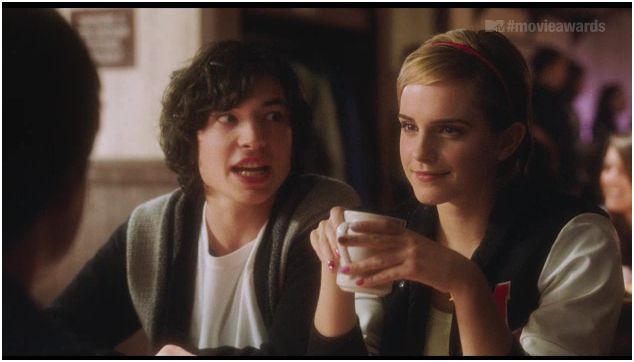
It's
hard growing up. It's even more problematic writing about those
experiences
with candour. Stephen Chbosky says that his novel, published in 1999,
isn't
autobiographical but he relates to the experiences. Many others would
also
testify to that because according to the New York Times, over 700,000
copies of
the novel were sold by 2007. Why then has it taken so long for a film
adaptation? Until now the political climate has been unsettled. After
its popular
release, the novel was banned in places like Massachusetts and Long
Island
because of its frank depiction of sexuality and drug use. This
censorship
movement coincided with a bill in 2004 that was proposed by Alabama
legislator
Gerald Allen, who argued that all public libraries should be banned
from
purchasing books that "promote homosexuality", by containing gay
characters or written by gay authors. As to how close the bill came to
passing,
Allen met with George W. Bush five times.
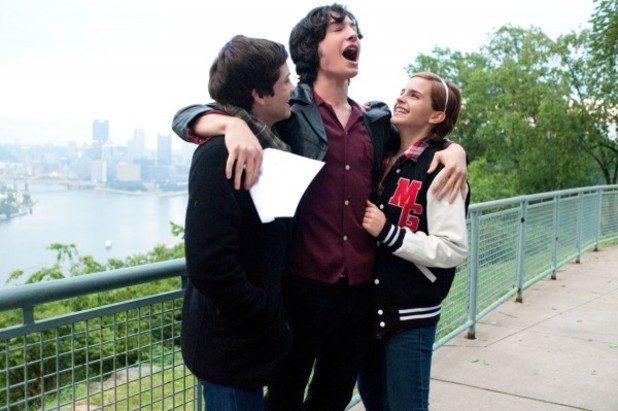
Since
then, Hollywood has been increasingly liberal about sex so it's easier
for
films to explore the subject. However, studios still demand mainstream
appeal,
which means that compromises are made in exchange for financial
support. Perks was developed by John Malkovich's
Mr. Mudd studio but distributed by Summit Entertainment, who produced
the Twilight films. This accounts for the
timid approach to the subject matter. The film settles for being
relatable and
nostalgic, rather than insightful or upfront. It's a missed
opportunity. I
haven't read the novel, but I am told it cuts even deeper, dealing with
issues
like date rape, pregnancy and abortion. Those threads have been omitted
from
the film, which means there are still social barriers that aren't being
crossed. Simultaneously, Chbosky's film seems bloated and distant. It
has a
checklist of confronting teenage issues, which could sadly be referred
to as
clichés. Suicide, hallucinations, gay bashings, drug use and child
abuse, are
some of the major concerns here. Why include these though if you're
only going
to address them at arm's length?
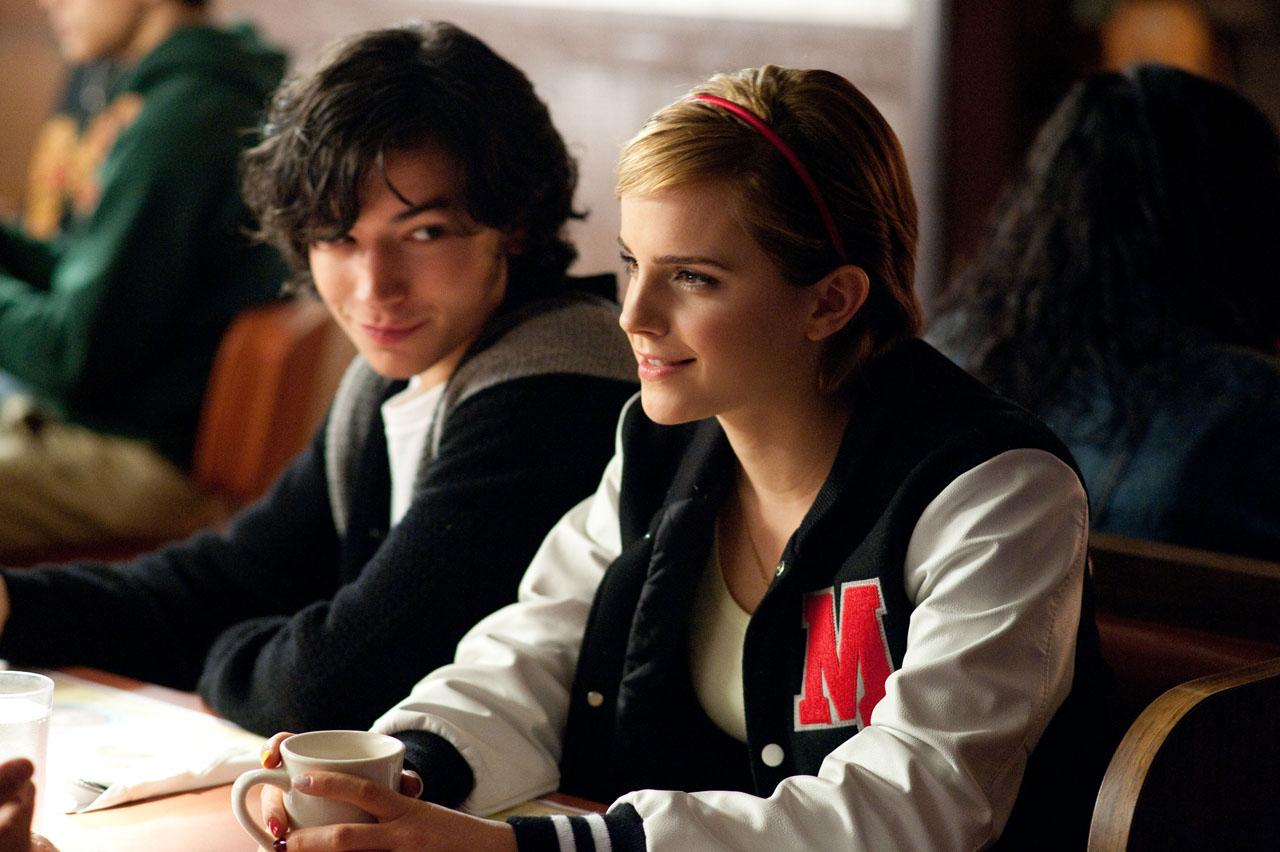
At
least tonally the depiction of high school is handled with more
maturity than many
similar films. The sense of isolation
and the desire for friendship are
Chboksy's most resonant and successful themes. A long shot of Charlie
sitting
by himself reflects his dislocation from the rest of the school. Quiet
moments
like this have a reality to them, as does the bonding between misfits,
which
the film depends on. High school clichés about jocks and outcasts are
subverted
with a refreshing dose of optimism and humour. Charlie and his friends
are not
typical high school losers seen in other films. They happily live in
their own
private circle. "Welcome to the island of misfit toys", Sam
announces. They go to parties and social gatherings together and even
participate in performances of The Rocky Horror Picture Show on stage.
This in
turn helps Charlie become a less introverted student in class too,
which shines
a more positive light on high school itself.
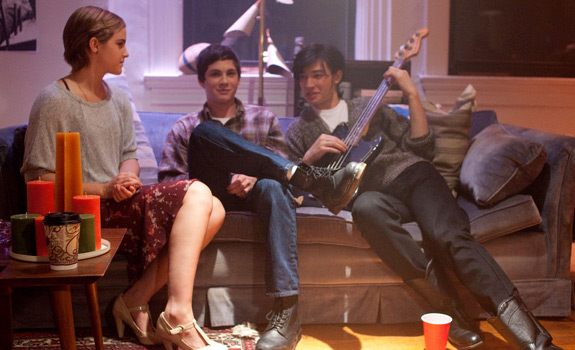
A
more complex notion is that Charlie's circle of friends is bound by a lack of self-worth. In each other's
company Chbosky's characters are not unhappy but each possesses some
internal
damage from either a past or perpetually flawed relationship: "We
accept
the love that we think we deserve", Charlie notes. Some of this
material
is very involving and powerful. A subplot involving Charlie's forced
relationship with Mary-Elizabeth is one of the film's best threads. It
shows
deep flaws in Charlie's character but also provides the film with a
dramatic
motor and explosive conflict within the group. Mae Whitman's work here,
the
impulsiveness to jump into a relationship and the inevitable hurt, is
impacting
and believable. Ezra Miller (We Need To
Talk about Kevin, 2011) shows a different side to himself with
great energy
and a surprisingly acute feel for comic timing. But limiting the film
to
Charlie's perspective, like the novel, means that Patrick's gay
relationship
with Brad is kept at bay, until a melodramatic climax. Emma Watson also
isn't
quite gritty enough to play a girl who is meant to have slept around,
though her
bond with Charlie is still fun to watch unfold.
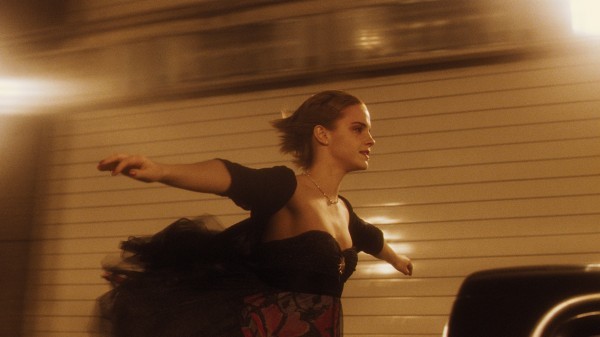
As
for Charlie, there's uncertainty about how to translate the darker
psychological material surrounding his character. His relationship with
his
aunt for example is presented through poorly realised flashbacks that
obscure
the issue instead of providing true insight. This is included in a
deficient
final quarter, which falters under cliché coming of age ramblings like:
"We can't choose where we come from, but where we go from there".
Overall, the film is relatable, funny and true, but it would have
benefited
from a defter touch. There are too many slow-motion scenes and montages
that
detract from the important issues that this sometimes palpable drama
tries to
face. What will it take for a mainstream film to pull no punches when
it comes
to adolescents and how much they carry on their shoulders?
|